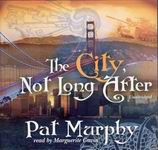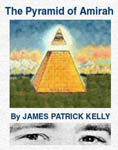
 The Voice from the Edge Vol. 1: I Have No Mouth and I Must Scream
The Voice from the Edge Vol. 1: I Have No Mouth and I Must Scream
By Harlan Ellison, read by Harlan Ellison
5 CD’s – 6 hours [UNABRIDGED stories]
Publisher: Fantastic Audio
Published: 2002
ISBN: 1574535374
Themes: / Science fiction / Collection / Series / Post-Apocalypse / Artificial intelligence / Utopia / Dystopia / Magic Realism / Love / Hell /
ed. – This is one of two Harlan Ellison collections that were released by Fantastic Audio. The second is called The Voice from the Edge: Midnight at the Sunken Cathedral.
There are two basic reasons to invest in a short story collection by a single author. The first is to experience first hand the stylistic, thematic, and technical contributions the author has made to his genre and to literature in general; the second is to sample the dynamic range the author covers, to gauge the extent of his palette.
This audio book delivers the first in spades. With Harlan Ellison’s friendly, yet curmudgeonly introduction, we are thrust immediately into the gritty rawness he helped bring to science fiction. Such stories as the harrowing, lurid, complex title story, the gleefully offensive misogyny and sociopathy of “A Boy and His Dog”, the pop-cultural, pejorative ranting of “Laugh Track”, and the sophomoric sexual preoccupation of “The Very Last Day of a Good Woman” clearly delineate the dark, adult-oriented themes he introduced, as well as his predilection for unlikable anti-heroes who often leave us feeling a bit less comfortable about ourselves. And on such material, his distinctive narrative style shines. He curses with conviction, and his voice handles guilt, revenge, and damnation with seeming familiarity.
In the overall story choice, we also have a remarkable demonstration of the range of Ellison’s writing. Compare the patient, redemptive power of “Paladin of the Lost Hour” to any of the stories mentioned above, and you’ll see what I mean. Throw in the sly, haunted twist of “The Time of the Eye”, the overwrought post-modernism and tedious beatnik vamping in “’Repent Harlequin!’ said the Tick-Tock Man”, the sublime, hellish search for love in “Grail”, and the puzzling juxtaposition of the truly horrific and the trivial in “The Lingering Scent of Woodsmoke”, and you cover quite a swath of not only the science-fiction spectrum, but the fiction spectrum in general.
Unfortunately, the use of a single narrator for all these stories blurs their uniqueness, especially since that narrator is Harlan Ellison. His delivery style can be enjoyable, but it is so raw, so exaggerated, and so pervasive that it tends to flatten the relief of the work itself. I can’t say that I question the wisdom of having Ellison narrate, for on any single story his voice adds the confident insight that only an author can bring to his own work. But this is a collection, and the diverse stories deserve a wider range of vocal performance to truly showcase their differences. My advice is to make the best of this paradox by taking the collection slowly. The quality of the material, the exceptionally crisp sound and the fine, user-friendly packaging make this an audio book you should not miss. Just make sure to pace yourself.



 The Pyramid of Amirah
The Pyramid of Amirah